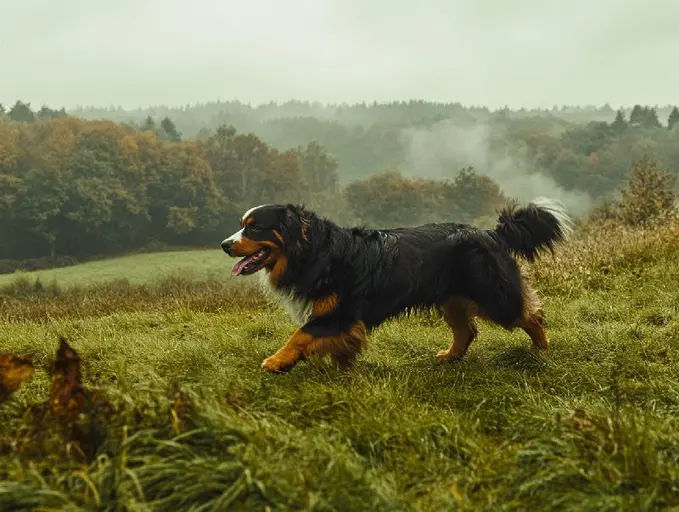Bernese Mountain Dog: A Gentle Giant’s Guide

Brief Introduction
The Bernese Mountain Dog, affectionately nicknamed a “Berner,” is a large, striking breed known for its beautiful tri-colored coat, gentle nature, and unwavering loyalty. Originating in the Swiss Alps, these working dogs are easily recognizable and beloved for their calm demeanor and affectionate personalities. They make wonderful family pets, though potential owners should be aware of their specific needs and potential health concerns. They are truly gentle giants among the canine world. This breed is known for its strength and intelligence, traits that served them well as farm dogs in their homeland.
Breed History
The history of the Bernese Mountain Dog is deeply rooted in the Swiss Alps. They are one of four Swiss Mountain Dog breeds, and their ancestors were likely brought to Switzerland by the Romans over 2,000 years ago. These dogs were originally used as farm dogs, performing a variety of tasks.
From Farmhands to Family Pets
- Drafting: They were used to pull carts loaded with milk, cheese, and other goods to market. Their strong bodies and willingness to work made them ideal for this task.
- Herding: They helped to herd cattle and other livestock, keeping them safe and preventing them from straying.
- Guarding: They served as watchdogs, protecting the farm and its inhabitants from intruders.
As farming practices changed, the need for these multi-purpose dogs declined. In the early 20th century, the breed faced near extinction. However, thanks to the efforts of a Swiss professor, Albert Heim, the breed was preserved and revitalized. Heim recognized the breed’s unique qualities and worked tirelessly to promote its resurgence. Berners made their way to the United States in 1926, quickly gaining popularity as companion animals.
Appearance
The Bernese Mountain Dog’s striking appearance is one of its most defining characteristics. They are large, sturdy dogs with a distinctive tri-colored coat.
Size and Build
- Height: Males typically stand 25-27.5 inches at the shoulder, while females are slightly smaller, measuring 23-26 inches.
- Weight: Males weigh between 80 and 115 pounds, and females weigh between 70 and 95 pounds.
They possess a muscular build, reflecting their history as working dogs. Their strong bones and well-proportioned bodies contribute to their overall imposing yet graceful presence.
Coat, Ears, Eyes, and Tail
- Coat: The Bernese Mountain Dog has a thick, double coat that is primarily black. This coat provides insulation from the cold temperatures of the Swiss Alps. The coat also features rich rust-colored markings on the legs, cheeks, and above the eyes, and bright white markings on the chest, face, and paws. The coat requires regular grooming to prevent matting and shedding.
- Ears: Their ears are medium-sized, triangular, and set high on the head. They hang close to the cheeks, framing the face.
- Eyes: Their eyes are dark brown and almond-shaped, conveying a gentle and intelligent expression.
- Tail: The tail is long and bushy, carried low when relaxed and slightly curved upward when alert.
Character and Behavior
Bernese Mountain Dogs are known for their gentle and affectionate temperament. They are loyal, intelligent, and eager to please, making them excellent companions.
Attitude Towards People, Children, and Animals
- People: Berners are generally good-natured and friendly with people. They are often described as being “soft” and sensitive, responding best to positive reinforcement training methods.
- Children: They are typically very gentle and patient with children, making them wonderful family pets. However, due to their large size, supervision is always recommended when interacting with young children to prevent accidental injuries.
- Animals: Bernese Mountain Dogs can get along well with other dogs and animals, especially if they are socialized from a young age. Early socialization is key to ensuring they develop into well-adjusted and confident adults.
Activity Level, Trainability, Breed Characteristics
- Activity Level: While Bernese Mountain Dogs are not hyperactive, they do require regular exercise to stay healthy and happy. Daily walks, playtime in the yard, and opportunities for off-leash exploration are all beneficial. However, it’s important to avoid strenuous exercise during hot weather, as they are prone to overheating.
- Trainability: Bernese Mountain Dogs are intelligent and eager to please, making them relatively easy to train. Positive reinforcement methods, such as treats and praise, are highly effective. Early socialization and obedience training are essential for developing a well-behaved and confident dog.
- Breed Characteristics: Bernese Mountain Dogs are known for their tendency to be “shadows” of their owners, following them from room to room. They thrive on companionship and do not do well when left alone for extended periods. They are also known for being somewhat slow to mature, often retaining puppy-like qualities well into adulthood.

Care and Maintenance
Proper care and maintenance are essential for ensuring the health and well-being of a Bernese Mountain Dog.
Care Features, Exercise, Feeding
- Grooming: The Bernese Mountain Dog’s thick, double coat requires regular grooming to prevent matting and shedding. Brushing several times a week is recommended, and more frequent brushing may be necessary during shedding season. They also need occasional baths to keep their coat clean and healthy. Regular nail trimming and ear cleaning are also important aspects of their grooming routine.
- Exercise: Bernese Mountain Dogs need moderate exercise to stay healthy and happy. Daily walks, playtime in the yard, and occasional hikes are all beneficial. However, it’s important to avoid strenuous exercise during hot weather, as they are prone to overheating.
- Feeding: Feeding a Bernese Mountain Dog a high-quality dog food that is specifically formulated for large breeds is essential. The amount of food will vary depending on the dog’s age, activity level, and metabolism. It’s important to monitor their weight and adjust their food intake accordingly to prevent obesity. A good rule of thumb is to feed an adult Berner approximately 3-4 cups of high-quality dry dog food per day, divided into two meals. However, this is just a guideline, and individual needs may vary. Fresh water should always be available.
Whether a Haircut and / or Combing Is Needed, Health, Possible Problems
- Haircut and Combing: Bernese Mountain Dogs do not typically require haircuts. Their coat is designed to provide insulation and protection, and trimming it can disrupt this natural function. However, regular combing is essential to prevent matting and tangles. A slicker brush and a metal comb are useful tools for maintaining their coat.
- Health: Bernese Mountain Dogs are prone to certain health problems, including hip and elbow dysplasia, progressive retinal atrophy, bloat (gastric torsion), and certain types of cancer. Obtaining a puppy from a responsible breeder who screens their dogs for these conditions is crucial.
- Possible Problems: Bloat is a serious condition that can be fatal if not treated promptly. It occurs when the stomach fills with gas and twists, cutting off blood supply to the stomach and other organs. Owners should be aware of the signs of bloat, which include restlessness, pacing, attempts to vomit without success, and a distended abdomen.
Breed Weaknesses
While Bernese Mountain Dogs are wonderful companions, they do have some potential weaknesses that prospective owners should be aware of.
Level of Aggression, Loyalty, Specific Weaknesses
- Level of Aggression: Bernese Mountain Dogs are not typically aggressive. However, like any dog, they can become aggressive if they are fearful, protective, or poorly socialized. Early socialization and training are essential for preventing aggression.
- Loyalty: They are extremely loyal and devoted to their families. This loyalty can sometimes manifest as protectiveness, so early socialization with strangers and other animals is important.
- Specific Weaknesses: One of the biggest weaknesses of the Berner breed is their relatively short lifespan. They typically live only 7-10 years, due to their predisposition to certain health problems, particularly cancer. They are also prone to overheating, making them less suitable for hot climates. Their tendency to shed can also be a challenge for some owners, as regular grooming is required to manage the shedding.
Conclusion
The Bernese Mountain Dog is a wonderful breed for the right owner. They are gentle, loyal, and affectionate companions who thrive on human interaction. They are best suited for families who can provide them with plenty of love, attention, and exercise. However, prospective owners should be aware of their potential health problems and relatively short lifespan. If you are prepared to provide them with the care and attention they need, a Bernese Mountain Dog can be a truly rewarding addition to your family. This breed is ideal for those seeking a devoted companion and are prepared for the commitment of a large-breed dog.
Frequently Asked Questions About Bernese Mountain Dog
-
What is a Bernese Mountain Dog known for?
Bernese Mountain Dogs, or “Berners,” are known for their beautiful tri-colored coat, gentle nature, unwavering loyalty. They originated in the Swiss Alps and make wonderful family pets.
-
What was the original purpose of Bernese Mountain Dogs?
They were originally used as farm dogs in the Swiss Alps, performing tasks such as pulling carts, herding livestock, and guarding the farm.
-
How big do Bernese Mountain Dogs get?
Males typically stand 25-27.5 inches at the shoulder and weigh 80-115 pounds. Females are slightly smaller, measuring 23-26 inches and weighing 70-95 pounds.
-
What kind of temperament do Bernese Mountain Dogs have?
They are known for their gentle and affectionate temperament. They are loyal, intelligent, and eager to please, making them excellent companions and typically get along well with children and other animals if socialized early.
-
How much exercise do Bernese Mountain Dogs need?
They require moderate exercise, such as daily walks, playtime in the yard, and occasional hikes. It’s important to avoid strenuous exercise during hot weather.
-
How do I groom a Bernese Mountain Dog?
Their thick, double coat requires regular grooming to prevent matting and shedding. Brushing several times a week is recommended, with more frequent brushing during shedding season. Occasional baths, nail trimming, and ear cleaning are also important.
-
What health problems are Bernese Mountain Dogs prone to?
They are prone to certain health problems, including hip and elbow dysplasia, progressive retinal atrophy, bloat (gastric torsion), and certain types of cancer.
-
How long do Bernese Mountain Dogs typically live?
They typically live only 7-10 years, which is shorter than many other breeds, due to their predisposition to certain health problems.
-
Are Bernese Mountain Dogs aggressive?
Bernese Mountain Dogs are not typically aggressive. However, like any dog, they can become aggressive if they are fearful, protective, or poorly socialized. Early socialization and training are essential for preventing aggression.
-
Are Bernese Mountain Dogs good family pets?
Yes, they are generally considered good family pets due to their gentle and affectionate nature. They are loyal and thrive on human interaction. However, prospective owners should be aware of their potential health problems and relatively short lifespan.

